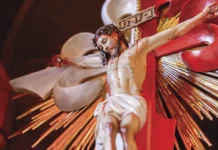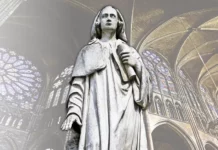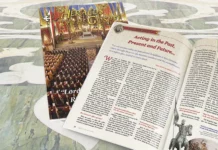Simon, up until then an insignificant man, slowly descended Mount Calvary with the conviction that his life would never be the same again: suffering with resignation had transformed him into a hero!
At humanity’s most tragic hour, a man emerged from the shadows of anonymity and disappeared in much the same way. However, thanks to him, the city of Cyrene, his birthplace, is inscribed in the great book of history.
The Gospels tell us that he was called Simon, “coming in from the country” and was “father of Alexander and Rufus” (Mk 15:21). Perhaps he was in no way different from the inhabitants of any little town: easygoing, concerned with the little problems of daily life. His monotonous and calm routine forecasted the irrelevant future of a man who was little or not at all concerned with the luminous horizons of heroism and Faith.
A divine plan hovered over Simon
Nevertheless, a divine plan hovered over this person: the up until then insignificant Simon of Cyrene was called to a mission that would awaken holy envy in all men of faith; he was to be the prefigure of innumerable chosen souls who would come to the fore in future centuries.
The great change took place on a Friday. It could rightly be said that, for Simon, everything began and ended on that day: the moment prepared by Providence from all eternity had arrived, and from then on his life would take a new course.
The dawn illuminated slow-moving clouds, pushed along at the mercy of the wind. The silence of nature presaged an inexpressive spring morning. At home, Simon was getting ready for his daily chores. He briskly took his staff and left for Jerusalem, where he had some tasks to fulfil. He had trod that road so many times that he knew every curve, and each view and rocky outcrop was like a childhood friend.
However, as he drew near to Jerusalem on that day, he was assailed by the sensation that something very out of the ordinary and unexpected was happening. As he progressed through the streets of the great city, the inexplicable sensation intensified. He could never have imagined that he was moments away from the encounter of his life!

“Why me, and not someone else?”
On a corner, the commotion of passersby and the tumultuous shouts of a crowd pricked Simon’s curiosity. His eye alighted on a certain man who advanced slowly, with great difficulty, carrying a heavy cross, amid shouts and insults from a mob who accused him of being a criminal. He was clearly a man condemned to death.
With each step that he took, he drew nearer to Simon, who felt his heart beat stronger. He was distressed to witness such intensity of suffering – something from which he had always fled.
Just as that Man of Sorrows passed in front of the Cyrenian, His exhaustion reached an apex, and He fell under the weight of the Cross, giving the hard stones the opportunity to kiss those wounds worthy of the adoration of all of humanity. Prostrate, the blasphemies from the callous executioners rained down on him. His sole companion was abandonment, the royal purple of His Blood His garment, and the Cross His standard.
Shocked and dazed, Simon contemplated that scene of extreme pain. Finally, the brutish order of a Roman soldier roused him from his stupor:
— Hey, you there! Come and help Him.
Simon tried to escape, but there was no way out. The imperative order was impossible to resist. Blood and fear, wounds and shame, pain and humiliation: all that he had shunned was imposed upon him all at once. Revolt surged deep within himself: “I have nothing to do with this! Why me, and not someone else?”
Strengthened by a piercing and captivating gaze
But God’s plans are not those of men. While his egoistic soul struggled before this terrifying scene, the Nazarene fixed him with a piercing gaze. And what a gaze!
What suffering, but also what goodness! What lacerating pain allied with such kindness! Those clear and serene eyes which supplicated compassion, penetrated the soul of the Cyrenian and enraptured him, prompting an immediate response.
Thus he set out with Our Lord Jesus Christ toward Calvary. The Cross weighed upon him, but with each step his fatigue was transformed into ineffable joy. The Blood of the Lamb of God stained his hands and purified his soul, which he now felt was whiter than snow in the noonday sun.
Amid the opprobrium and mockery of the Pharisees and their partisans, Jesus strengthened him with another look, encouraging him to push forward until the end. Simon did not hear a single word from the adorable lips of the Saviour, but rather felt the Sacred Heart of Jesus speaking words of consolation and gratitude to him in his heart.
In him, Mary saw all the Cyrenians of history
According to St. Mark “it was the third hour” when Jesus was crucified; and at the ninth hour He “uttered a loud cry, and breathed His last” (cf. Mk 15:25-37). Gradually the scornful mob dispersed. Only a few people remained at the foot of the Cross.
From a distance, Simon contemplated Calvary, turning over in his mind all that had happened during those unforgettable hours; his imagination projected, so to speak, all the scenes of that day before his mind’s eye. The Cross had come and gone, but it had left his soul filled with joy.
Finally, it was time to go back home… He slowly descended Mount Calvary with the others, but with the conviction that his life would never be the same again: suffering with resignation had transformed him into a hero.
Until the end of his days, Jesus’ gaze inviting Simon to accompany Him along the sorrowful way remained engraved upon his soul. But little did he realize that on that blessed day the maternal look of the Blessed Virgin had also rested upon him, imploring God the Father for superabundant graces for him to accept all the sufferings that at each step her Divine Son would ask of him.
And there was more. Through Simon, Mary contemplated all the souls across history who would be called to lovingly carry their respective cross, as Cyrenians of the Holy Catholic Church, the Mystical Body of Our Lord Jesus Christ. And She prayed for them all.
How do we receive the sufferings sent by God?
These reflections invite us to make an examination of conscience:
When suffering knocks at the door of our soul, how do we receive it? With love and generosity, like the Cyrenian, or in a poorly veiled attitude of revolt against God for having sent us sorrows and sacrifices? Are we aware that the heavenly Father places crosses along the route of our pilgrimage to purify us, increase our merits and, as a result, our glory in Heaven?

So, just as gold is purified of all dross in the crucible, we also need to pass through the “crucible” of sorrows and humiliations to be purified of the dross of sins and imperfections. Therefore, we ought to gladly accept the sufferings sent by Providence, whether of body or soul. After all, does not He who was innocent, and who immolated Himself for us on the Cross, deserve to receive assistance from us sinners in an insignificant portion of pain, in comparison with His inexpressible suffering?
Let us, then, accept with souls full of love, all the sacrifices that arise along our way so as to climb together with Our Lord to the height of our own Calvary. “Ah! But I don’t have the strength for this!”, someone might exclaim. It is true… “Without Me, you can do nothing” (Jn 15:5), the Divine Teacher affirmed. Nothing!
Therefore, no one has the strength to practise the least act of virtue, much less to love sufferings. However, let us remember that they are sent to us by God, as a gift from a father to well-beloved children, and let us request the necessary graces from Mary Most Holy, who did not hesitate to sacrifice her Son for our salvation.
With full confidence, let us say this prayer of Prof. Plinio Corrêa de Oliveira to Her: “My Mother, help me in my weakness, in my littleness; free me from all that is miniscule and micro within me, and make of me the great hero of glorious feats to which Thou callest me!”1 ◊







